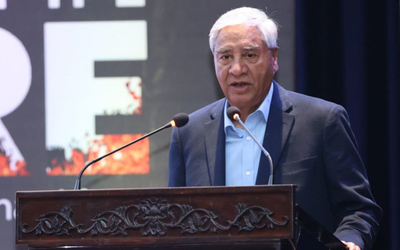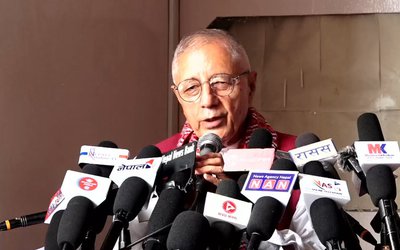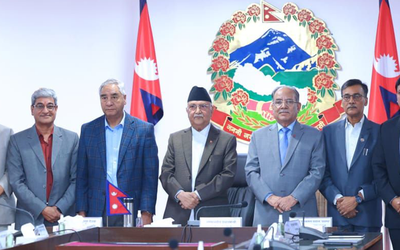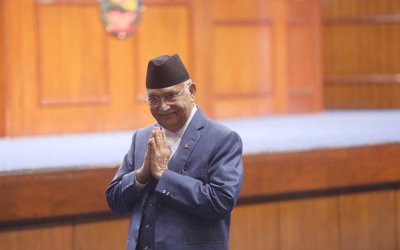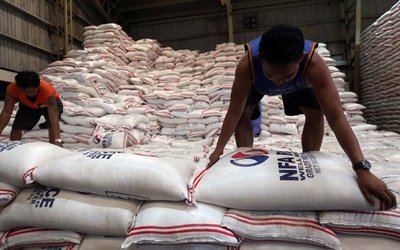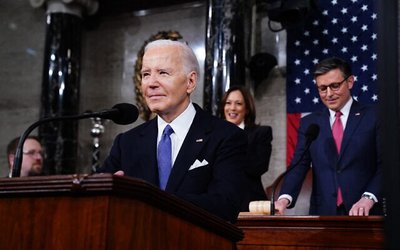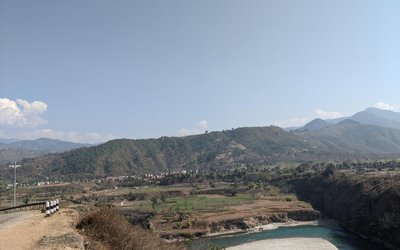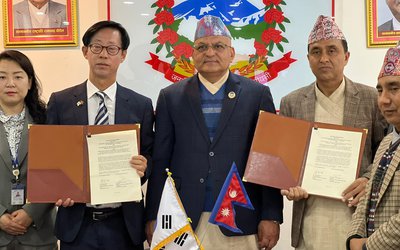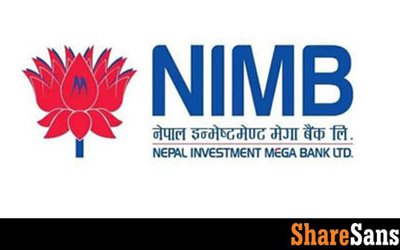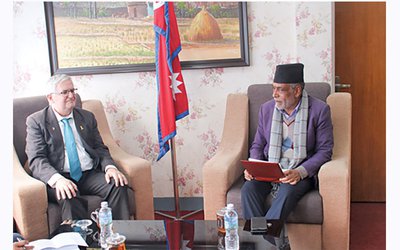
Prime Minister KP Sharma Oli has said that for the past three years Nepal’s economy was in the trajectory of higher growth rate. He said that Nepal had made significant improvements in 14 global different indicators, including human development index, doing business index, hunger index, law and order and rule of law index, tourism competitiveness, gender equality, school education, children and health care.
“However, it is sad that COVID-19 has negatively impacted Nepali economy. We will soon end this adverse situation and will reverse back to the normal,” said Oli Addressing a special ceremony organised at Tundikhel on Saturday on the occasion of the sixth Constitution Day (National Day),
“The Government has rolled out economic stimulus measures to create conducive environment for smooth operation of industries/businesses affected by Covid-19 through budgetary and monetary policies. These measures range from tax concessions to rebate on preferential interests and electricity bills as well as contribution to the social security fund by the Government on behalf of the workers. In order to stimulate the economy, the Government has provided a refinancing fund covering sectors such as agriculture, energy, tourism, and cottage, small and medium industries. Through these measures, more than NRs. 200 billions of investment will be mobilized.”
PM Oli said that it is a matter of satisfaction for us that despite almost six months of disruptions in the economic activities, all indicators of the economy, except economic growth rate, are positive.
He said that any shortcomings which may have remained in the governance system formed by the Constitution written by the people's representatives could be addressed in the days to come.
Full text of the Prime Minister's address on the occasion of the sixth Constitution Day
We are present here today to celebrate the sixth Constitution Day and the National Day. Having completed the seven decades long struggle and the six years of deliberation, debate, and consensus while writing the Constitution, we had promulgated the Constitution of Nepal through the Constituent Assembly five years ago on this day. On the occasion of this historic day, first of all, I extend on behalf of the Government of Nepal and on my own behalf, felicitations and best wishes of the Constitution Day and the National Day to all Nepali sisters and brothers in the country and abroad. I offer heartfelt condolences to all known and unknown martyrs for their martyrdom during the movements. I express high respect to the seniors who took the leadership of different movements up to the moment of the promulgation of the Constitution written by the people themselves through the elected Constituent Assembly. I express sincere esteem to all compatriots who contributed to the struggles: by being subjected to enforced disappearances; being deprived of family and property; and bearing damages in physical, mental and family terms.
For the past three years we have been observing the National Day in a variety of ways. In the first year of the elected Government after the promulgation of the Constitution, we held a formal event. We deliberated on the people’s aspirations and prepared foundation to move them forward.
Last year, instead of a formal official function, we made efforts to celebrate it as the national festival that every household talk about. We reviewed the works completed to fulfil the people’s aspirations and discussed progress thereto.
This year, we have been discussing about the pandemic and its impacts that have wrecked our social life and posed serious jolt on our rising economy and the development endeavour. We are observing the National Day within the limitations set by the pandemic. We are expressing grief and condolences on the loss of life and property.
The life is yet to become normal since we first announced the lockdown for the prevention of the COVID-19 pandemic. Over 60,000 sisters and brothers have been infected within the country. Though more than 43,000 infected persons have been recovered in this period, the pandemic has taken toll of nearly four hundred persons within the country and several hundreds of Nepalis compatriots working in the foreign countries. While wishing for a speedy recovery of those infected, I express profound sadness on the loss of life of so many Nepalis. I express my deep condolences to all Nepali sisters and brothers, both in the country and abroad, who are grieving the pain of losing their relatives.
Like the entire humanity has been facing natural disasters, so do we Nepalis every year. On top of the pandemic, earthquakes, floods and landslides, hurricanes and fires are the natural disasters that we had been confronted with. Caused by incessant rain in different parts of the country this year, dozens of Nepalis have lost their lives due to floods and landslides and dozens of them have lost entire families. Some settlements have been devastated, while many families are rendered homeless. The number of Nepalis who succumbed to the natural disasters is close to the number of fatalities due to the pandemic. I feel aggrieved on the loss of lives due to the catastrophe and express my deep condolences to the bereaved family members. I wish those injured an early recovery.
As a rule of the nature, life goes on despite pandemic or disaster. Seasons change. People continue their life, no matter how much pain and anxiety they might be in. They sing the songs of heroes on the designated days and respectfully remember the revered ones. They reiterate the commitments, and vow to accomplish the remainder of responsibilities. This year, we are participating in the observance of the National Day amid the mourning and determinations, and pandemic and the disaster.
Fellow Nepali sisters and brothers,
The COVID-19 was a crisis that suddenly emerged. No country in the world was prepared to face it. Neither were we. In the beginning, even the experts involved in the research of the effects and trends of the virus seemed to be in a state of confusion. There was a mix of rumours, skepticism, and terror. Some supported the lockdown, while others were against it. There were many speculations as to how it transmits; how we could prevent it; and how long the pandemic lasts for. Debates were held to the extent that whether it is a pandemic or an endemic.
For the first time, the lockdown took effect on 24 March this year, one day ahead of the neighbouring country, India. Only two cases of infections had been reported by then. In the neighbouring China, the pandemic had already come under control, while in India the number of infected persons was limited in three digits. All over the world, essential medical logistics, including mask, were in short supply at that time. The scarcity was acute. Even China, which is considered the major source of medical logistics these days, faced shortage of surgical masks. Countries in the neighbourhood, as a gesture of solidarity, were supporting with surgical masks, within their capacity.
I have been discussing these matters to visualize the situation then being mindful of the human nature of panicking in crisis and forgetting as time passes by. At that time, some among us were frightened a bit, a few of us were also of the view that nothing will go wrong. In totality, we were confident that we could contain corona by the well-meaning cooperation from the people. We enforced lockdown measures. We held all-party consultation; and in consultation we took measures of prevention, control and treatment to the extent of our capacity. We put forward the policy of “protecting the lives of the people first”. Based on the available facts, we tried to make people aware in every possible way. During this period, I made formal addresses from time to time in my capacity as the Prime minister. I addressed just before going to the operation theatre for kidney transplantation and soon after having been discharged from the hospital. Through these addresses, I had the dialogues with the compatriots about the works done and works to be done. I emphasized not only about maintaining social distance, using masks, and washing hands time to time but also urged the entire nation to join the ‘healthy Nepal campaign’ by enhancing immunity. In this national campaign of preventing, controlling and treatment of this pandemic, there remained an active involvement of doctors and health workers, security personnel, all types of workers/civil servants, people’s representative working in all three tiers, experts, political parties and general people, which is a matter of satisfaction.
Sisters and brothers,
Adequacy is a relative term. The Government not only has taken this pandemic as a challenge but also has utilized it as an opportunity and implemented the plan to strengthen health infrastructure all over the country through the annual budget of the current fiscal year. Leaving aside the criticism from the margin, if we are to make a brief assessment of the steps taken so far to control the pandemic, the picture looks not destressing but an impressive one. There is a huge difference between the poor situation prior to the COVID infection in Nepal and the state of remarkable progress that has been made in the development of health infrastructure and capacity thereafter.
When the first positive case of COVID-19 was detected on 23 January 2020, the sample had to be sent overseas as it was not possible to do RT-PCR test in the laboratories within the country. Now there are 33 Government and 14 private RT-PCR testing labs in operation within the country. Daily testing capacity is above 23,500 samples.
In the beginning, the testing cost was NRs. 8500 per sample. Now the testing can be done at NRs. 2000 both in the Government and private laboratories. Our estimated commitment of the RT-PCR testing of at least two percent of the population has been fulfilled and it now appears that the estimation was less. The PCR testing rate has crossed 30,000 per million population.
Before, the ICU bed capacity was 1,551 and now it has been increased to 2,600 beds.
Earlier the number of ventilators was 770, now it has been raised to 900.
Before, the hospital services were available only in those local levels with the district hospitals, now arrangements have been made to build five-bed hospitals at the remaining 649 local levels. Necessary infrastructure, medical logistics, human and financial resources have been arranged to the provincial governments and hospitals.
Preparation for mobilization of 100 post graduate doctors under the Ministry of Health have been completed. Rapid response teams led by specialist doctors have been kept ready-to-deploy position in 25 hub hospitals and 20 teaching hospitals.
Majority of Nepali people are fully aware of the symptoms of COVID-19, and the precautionary measures such as washing hands, staying away from crowd, and using masks. The information for raising public awareness and averting risk has been regularly disseminated through the mobile ringtone, toll-free hotline telephone, web portals, radio, television, social media and newspapers and daily briefing of the Ministry of Health and Population.
The necessary protective items including PPE are available for handling cases. Basic health items including masks and sanitizers are readily available.
Earlier there was a confusion regarding the traditional medicine. Now we have started hearing the experiences of infected persons healed from the use of herbs and Nepali traditional medicine.
Sisters and Brothers,
Last year on this very day, I had presented a brief update on the achievements made in the 18 months of my Government. Had there not been the Corona pandemic, today there would have been the discussion on the accomplishment of many of the works promised last year. Some of the National Pride Projects would have been inaugurated. Bhairahawa International Airport would have come into operation. Power production would have started from the Upper-Tamakoshi hydro-power project. Melamchi’s water would have begun to run. Reconstruction of Ranipokhari would have been completed. Construction of Dharahara would have been over. Reconstruction works of the private residential housing would have been fully completed.
For past three years, our economy was in the trajectory of higher growth rate. Nepal had made significant improvements in 14 global different indicators, including human development index, doing business index, hunger index, law and order and rule of law index, tourism competitiveness, gender equality, school education, children and health care. However, it is sad that COVID-19 has negatively impacted Nepali economy. We will soon end this adverse situation and will reverse back to the normal.
The Government has rolled out economic stimulus measures to create conducive environment for smooth operation of industries/businesses affected by Covid-19 through budgetary and monetary policies. These measures range from tax concessions to rebate on preferential interests and electricity bills as well as contribution to the social security fund by the Government on behalf of the workers. In order to stimulate the economy, the Government has provided a refinancing fund covering sectors such as agriculture, energy, tourism, and cottage, small and medium industries. Through these measures, more than NRs. 200 billions of investment will be mobilized.
It is a matter of satisfaction for us that despite almost six months of disruptions in the economic activities, all indicators of the economy, except economic growth rate, are positive.
While many of the countries around the world registered negative economic growth following the outbreak of the COVID-19 pandemic, Nepal’s growth rate is still in positive zone.
Though revenue and expenditure situation has been affected by the pandemic, overall public finance is still in balance. The Government has undertaken reform measures in the revenue system with far-reaching importance.
Inflation is under control. The Government has ensured smooth supply of daily essential items for the people even during the situation of lockdown and restriction of movement. Supplies of essential commodity items such as energy, staple food, vegetables, fruits and medicines are adequate. At the moment the stock of staple food grains is in adequate quantity with the Government and the private sector.
Foreign trade deficit is on the course of improvement. Even during the current state of lockdown, remittance inflow is steady. Even during this period, remittance inflow is above the monthly average of the same period last year. During the last three months, from mid-May till mid-August, a total of NRs. 287 billion remittances have been received.
Throughout the previous year, the balance of payment has remained positive at the surpluses of NRs. 282 billion. Total foreign exchange reserve has reached NRs. 1,401 billion.
Foreign development cooperation is on the rise even in the context of the global economic downturn triggered by the COVID-19. During this period, a total of NRs. 500 billion worth of commitment for development cooperation has been received, including NRs. 168 billion budgetary support. During this two-year period, more than NRs. 200 billion foreign investment has been approved, while investment commitment of more than NRs. 1400 billion has been received.
The Government has maintained stability in the Banking and financial sector. There has been considerable extension of banking services in the country. Additional NRs. 200 billion liquidity has been injected in the banking sector for private sector investment. Due to adequate liquidity in the banking sector, interest rates are going down enabling the economy to remain afloat. Banks are capable to address credit demand that would be created once the industries/businesses return to normalcy. There has been considerable expansion in the coverage of insurance and capital market.
As far as possible, development works have been given continuity even during the lockdown. During this period, a total of 178 km road has been black-topped. Eighty-nine motorable bridges have been constructed. And more than 53 thousand private houses destroyed by the earthquakes have been reconstructed.
Brothers and Sisters,
On the 6th of June this year, our parliament has taken unanimous decision on the matters pertaining to the sovereignty and territorial integrity of the country. Our constitution has achieved complete acceptability through the amendment of the coat of arms. That day, on which the entire country stood united, will go down in history as a rare and an unforgettable day. I would like to thank all the Honourable Members of the Federal Parliament. While congratulating all the compatriot brothers and sisters on the occasion, I would like to remember that historical moment with a sense of pride.
I have been dismayed by the attempts to cast doubt or create confusion from some quarters about this Government, ruling party and my allegiance to democracy from the day I assumed the leadership of this Government. I have been saying – dissident voices get space in democracy, and they must. But democracy is not a system that feeds on rumours and swings its course. Democracy is the alternative to autocracy; and it is the rule of law. It is a dignified and disciplined system.
Free press is the voice of democracy. It strengthens democracy; reinforces democratic culture, behaviour and practice. I consider that our mass media too should remain committed and be successful to the protection of people’s right to true information and raise itself to the level of ‘professional journalism’ by bearing the responsibility of ‘disseminating the fact-based truth and informing the society’. The media and intellectual circle that contributed for the forward-looking movements even during the controlled and weak state of yester-years should not be confused of their path. I have found that Nepali people expect even clearer and consolidated contribution from them.
During the times of crisis, when people are suffering, there is a risk of polluting popular opinion by false rumours. From the last one year onwards, I have heard questions being raised against our democracy, republic and federalism sometimes faintly and sometimes in a more audible manner. In my previous address to the nation, I had said: when the nation decides, there is no hesitation but determination. Federal democratic republic is the historic decision of the people of Nepal. It is the duty of all of Nepalis to honestly endeavour in strengthening it.
Meanwhile, there have been planned attempts from some quarters to destabilize Nepal’s politics and the Government. By defeating such efforts, we Nepalis have once again ensured stability in the Government and the country.
Last year, a political force that sought an alternative not only to the Constitution and the system but also to the national integrity itself, unconditionally came into the fold of political mainstream. I had said last year as well that if someone considers any Article and Sub-Article has compromised our rights, they will be amended in the course of time based on justification and need. I had called upon to renounce unconstitutional activities and come into the national mainstream to enjoy the rights guaranteed by the Constitution. The amendment to the Constitution done unanimously in the recent past has confirmed it. I wish to reiterate on this occasion of the sixth Constitution Day and National Day: "Our Constitution is an all-inclusive dynamic document. Considering it as the centre of strength, let all parties/groups mainstream ourselves and be active constructively and creatively.” I would like to clarify again that the Government is always prepared to remove through dialogue the suspicion and ambiguities, if any.
Brothers and Sisters,
I wish to briefly touch upon a topic here today. While addressing this ceremony two years ago I had said: the confusion seen in the context of development is due to a mismatch between those who move slow and say “of course, it will happen” or those who do not move at all and say “they will do it” and those who want to 'run fast for rapid development' as per the aspiration of people. This mismatch is yet to be ended. So, I want to emphasize again that we do not have the luxury of assuming “it will happen by itself” or “they will be doing it”. We must translate the commitments into results. Our presence in the government is to fulfil the people’s aspiration of ‘rapid development in an accelerated speed’. We have taken that fact in mind.
We all know that our bureaucracy and all state machinery did not stood as obstacles in our campaign for overall change in the system. A question comes up: what element is obstructing the bureaucracy that not only supported but also participated in such a massive change from becoming a vehicle of ‘rapid development in an accelerated speed’? Is that element the unhealthy politics of rejecting the ongoing development and progress itself? Or is it because of the political leadership that led such a huge change but could not manage the achievement and become a leader in developing a system? The perception that ‘it doesn’t work, it doesn’t work at all’ is being forcefully publicised. We must be able to respond to this not by arguments but by behaviour and achievements.
As regard to development, the existing legal arrangements such as the Public Procurement Act are a bit incongruous and the type that consume a lot of time. By virtue of some legal arrangements still being incomplete and vague, the work of infrastructure development has been badly impeded. Now an appropriate change will be made in this regard.
We know this as well that there is a huge gap between development plans and the required resources and their availability. Few decades ago, the developed countries of today had also gone through similar situation like ours. They did not allow missing any potential opportunity wherever the required means and resources would be available for the development. They focused on ‘results not on colour'.
Let’s think, why are we looking for particular ‘black or white’ cat for ‘catching mice'? Let us leave behind all sorts of parochialism and biases and move ahead united on the path of development and progress.
Good governance and transparency are necessary condition for development. Controlling abuse of authority, corruption and irregularities is challenging. I have been saying time and again that ‘I will not involve in corruption; I will not let others do it either; and I do not maintain double standard'. The regulatory authorities have played an important role during this period in the campaign of the Government against corruption. The Commission for the Investigation of Abuse of Authority alone has filed 792 cases in the last two years. Similarly, the Department of Revenue Investigation has filed cases against 1027 people on revenue leakage, foreign exchange fraud and illicit financial transactions (hundi), claiming a total of NRs. 31.05 billion in fines.
In over seven decades of struggle for democracy, we mobilized people against the feudal reactionary State-power. The State-power that was targeted 'to be demolished and discarded' through our opposition came to an end after the promulgation of Constitution by the Constituent Assembly. We are now operating under a new State system created by the Constitution which was written by the representatives elected by the people for themselves. A question emerges: we can fix the potholes, if there are any, in this ‘state system’ that we made for ourselves. But instead of strengthening it, creating a situation against it knowingly or unknowingly, like the autocratic system of the past, cannot be justified in any way.
Sisters and brothers,
I believe that our economy will get back on the track soon after the risks of the pandemic recedes. In the situation that all other indicators of economy remain the same, economic growth will progress and take up its expected rate once tourism and other service sectors resume. The pandemic is but a temporary phenomenon. With its end, the country will advance towards the direction of realizing the resolve of “Prosperous Nepal, Happy Nepali”.
Once again, I express my best wishes to all on the occasion of the sixth Constitution Day and National Day.
Thank you.
K P Sharma Oli
Prime Minister
The Sixth Constitution Day and the National Day
19 September 2020 (3 Ashoj 2077)
- Nepal Produced Records Paddy This Year
- Jan 04, 2025
- Weather Forecast: Mainly Fair In Kathmandu Valley
- Jan 04, 2025
- KOICA and Gandaki Province Sign ROD to Establish Gandaki Institute of Technology
- Jan 03, 2025
- NIMBL Opens Extension Of Branchless Banking Services In Dhuniveshi
- Jan 03, 2025
- Agriculture Minister Thanks Israel Government For Its support In Agriculture sector
- Jan 03, 2025


